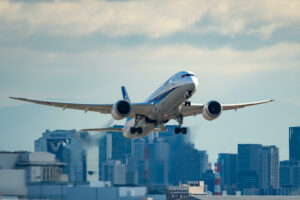Towards sustainable aviation fuel (SAF)

Aviation is a stubbornly difficult strand of transport to decarbonise. Aircraft burn huge amounts of fossil fuel, for business travel, leisure activities and tourism that used to be prohibitively expensive but in recent decades have become accessible to large populations as fossil fuels became cheaper in real terms.
Demand management aside – and that too is on the table, of course, alongside that Swedish phrase flygskam, or ‘flight shame’ – very few industry observers truly think that batteries will make the sort of gains in energy density to ever be capable of displacing liquid fuels for aviation applications. Hence, the question arises whether sustainable replacements for fossil liquid fuels can be developed and then made in sufficient quantities.
Oxford’s Department of Chemistry has become a leading authority on so-called Sustainable Aviation Fuel (SAF), broadly described as sucking CO2 from the air and combining it with green hydrogen made from water.
The resulting fuel is therefore carbon-neutral and does not involve digging up and burning fossil fuel. However, the process is in its infancy and the sort of scale that will be required rests on the emergence of large carbon-capture and green hydrogen sectors.
Dr Tiancun Xiao, a Senior Research Fellow, will present his exciting findings at COP 26 on 5 November. He told QUAD that his newly-founded (summer, 2021) company OxCCU Tech has already raised a significant amount of funding and his aim is to see a Boeing Dreamliner fly from London to New York return, entirely fuelled by this net-zero liquid fuel, within three years.
Other news stories
Associated people


